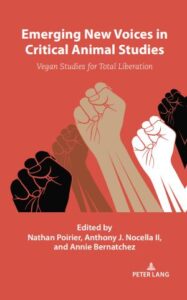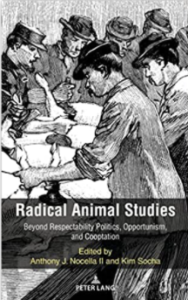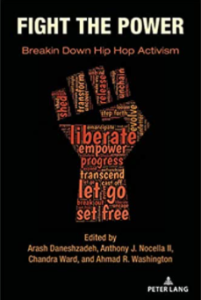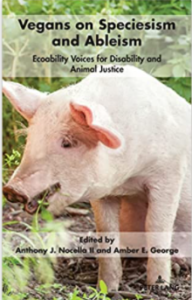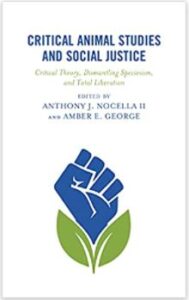Scholar-Activist Spotlight with Les Mitchell – October 2019

Annie Bernatchez – Your book has recently been published. What inspired you to write Reading the Animal Text in the Landscape of the Damned? Could you tell us what it is about?
Les Mitchell – The central question is why is it that good caring people take part in and/or support the mass institutionalized oppression of nonhuman animals? It is about looking at the texts of our normalized violence which are all around us and trying to understand them and the ideologies behind them. These texts are physical as well as language based and this enquiry takes in all sorts of areas including farming, slavery, the oppression of women, history, animal testing, economic exploitation, social psychology, human-human violence and much more.
Realizing these texts exist and interpreting them from a position of those with little or no power makes the world a different place bringing the animal story out of the shadows as well as highlighting the intersectional nature of our struggle.
Find the book here.
AB – What have you learned from researching the meanings of texts from the perspective of oppressed groups and individuals? Have these findings influenced your scholar-activist stance?
LS – This is an ongoing process. Hardly a day goes by without my realizing something about language or about texts of the physical world which I had not noticed before. Or perhaps it might be more accurate to say, that I had previously taken for granted. This means that once we are aware of them, the forms and pervasiveness of the hierarchical oppression of nonhuman and human animals continually emerge as well as their interconnectedness.
AB – In an article about nonhuman animal farming, you identified a sort of “moral disengagement”, what do you mean? How is this concept relevant to CAS perspective and principles?
LS – Moral disengagement is when we carry out acts which would normally be against our principles but with moral disengagement, we feel no responsibility for the suffering we cause. This is essentially about good people doing bad things and not feeling any moral responsibility for them. It is an incredibly powerful and widespread mechanism.
What I think we have to learn is how to recognize the conditions which facilitate this and how to disrupt them in order to bring about moral re-engagement. This is something which sometimes happens naturally but we can use it as a strategy to help people to overcome the mechanism and connect with the results of their actions.
AB – As the director of ICAS Africa, have you noticed any divergence or congruence in discourses about nonhuman animals between Africa and elsewhere? Is there any kind of stability in nonhuman animal oppression in Africa or is there a tendency toward changes? Why?
LS – There is really so much to learn and we have so many cultures, languages and histories. It would be so interesting to examine the multiple discourses about the living world in these diverse cultures and how the discourses might have changed over time. For example, how did the old cultures understand nonhuman animals and our relationships with them, how did they view the world they lived in? Of course, the discourses of capitalism and the West are becoming more and more dominant so time is getting short for much of this research.
AB – What are the future projects for ICAS Africa?
LS – We are very few actual members of ICAS and are separated by long distances However there are many who essentially share ICAS principles in whole or in part and for the last two years we have organized The Cape Town Animal Conference at the University of Cape Town. It is open to all, free and has speakers who are activists and academics. This year we had two venues running over two days. Apart from this big event people have their own specialist interests and advocacy.





